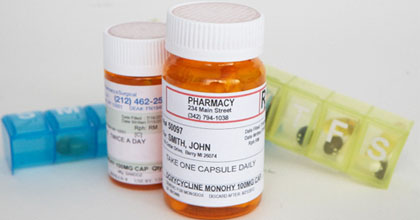
Medications can be incredibly helpful, or can land you in the emergency room. They are also the most common way we treat ourselves (i.e. over-the-counter cough syrup) or are treated by a doctor (i.e. prescription medication for an illness). It’s important you know how to understand, manage, and talk to your doctor and other health professionals about your medications so you can use them safely and effectively to get better care.
What We Mean By “Medications”
Mixing Medications Can Be Dangerous
Talk to Your Doctor About Medications
Use Your Pharmacist as a Resource
Questions to Ask About New Medications
Call Your Doctor if Anything Changes
Create and Use a Medication List
What We Mean By “Medications:” These include medicines your doctor prescribes for you or gives you as a sample; over-the-counter medications you can buy without seeing a doctor (such as aspirin, cold medicine); herbs or remedies (such as Echinacea, Ginseng); vitamins (such as a multi-vitamin, vitamin C); supplements (such as protein powders, Lysine).
Mixing Medications Can Be Dangerous: Medications are like people: they don’t always get along. They often interact, and some of these interactions can be harmful or make them less or not effective. Additionally, medications may not mix well and can be harmful when used with other substances, such as alcohol or illegal drugs, or depending on the medication, even seemingly harmless things like sunshine, dairy, or grapefruit. They are not meant to be shared, either: your prescription is for you and you alone.
Medications, including alcohol and drugs, can impact the care you get at an emergency room, so if you land in one tell the people who work there what you’ve taken.
Talk to Your Doctor About Medications: You should be able to talk to your doctor openly about any medications you are already taking, or thinking about taking (see list of questions below). If you don’t feel like you can, find a new doctor! Be sure to tell all of your doctors or care professionals about all of the medications – and anything else, including alcohol or illegal drugs – you are taking. Always remember that your have rights (for Privacy and Confidentiality), and that most doctors and nurses have seen and heard it all.
Use Your Pharmacist as a Resource: Pharmacists often know more about what you are taking and how it might interact than your care provider. You can call or go to a pharmacy (for free) and ask any questions (like the ones below), not only about your prescription medications but anything you take over-the-counter. Try to use the same pharmacy for all your prescriptions. This way, your records will be in one place, at it can help catch any medication errors or problems.
Questions to Ask About New Medications: When your doctor prescribes a new medication for you, find out as much about it as possible. Say Ah! has composed the following list of questions to help you make an informed choice about the medication, and then if you decide to take it, to help you do so correctly. Take this list with you to your doctor’s appointment, and review it with your pharmacist:
-
What is the name of the medication?
-
What is it for?
-
What will it do?
-
Is this medication the only way to treat my illness, and if not what are my other choices?
-
What are the benefits (the good things about it)?
-
What are the risks?
-
What are the side effects?
-
How can I expect to feel when I first start taking it?
-
What should I do if I have a problem with it?
-
Will it interact with any of my other medications?
-
How long should I take it, and will I need a refill?
-
How do I take it (i.e. with food)?
-
What if I miss a dose?
-
Are there things I should avoid while taking it (sunshine, milk, grapefruit)?
-
How soon will I feel the effects of the medication?
Call Your Doctor if Anything Changes: Keep your doctor informed if anything changes with your medication. Changes can include that you want to stop taking it, that it makes you feel worse or isn’t helping, that you can’t afford it, that you have been prescribed another medication and/or have started taking a new over-the-counter medication, herb, vitamin or supplement.
Create and Use a Medication List: This is your own great resource to use for everything from regular doctor’s appointments to emergency situations. You want to include everything you are putting into your body that is not food: prescription and over-the-counter medications, vitamins, herbs or remedies, supplements, and yes, alcohol or any other substance. If you make a list, it should have:
-
The date you made the list
-
The name of what you are taking (aspirin)
-
Why you are taking it (headache), and when you started taking it
-
How much and dosage (1 pill, 325 mg)
-
How often (once a day)
-
When and how (8 a.m. with food)
-
The doctor who prescribed the medication(s) and his/her contact info
